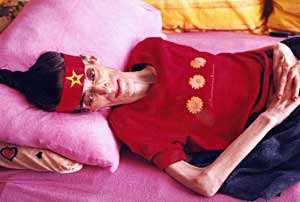30 June 2005 Edition
TURKEY - your holiday destination... - AN OPEN LETTER

Sevgi Erdogan who died on the Turkish death fast in July 2001
TURKEY - your holiday destination...
AN OPEN LETTER
One of the most popular destinations for Irish holidaymakers is the beautiful country of Turkey, with its miles of golden beaches, wonderful Mediterranean climate and friendly people. However, Turkey's hidden side is little known to the tens of thousands who travel there each year. Underneath the facade of democracy, fascism and oppression thrive. Before booking your holiday, we the undersigned would ask people to read the following:
In 2000 the Turkish Government revealed its plans to replace the old dormitory- style prisons with a new isolation-style prison know as F-types. Prostesting the introduction of the new prison system, hundreds of political prisoners embarked on a hunger strike in October of that year. Initially, the strike attracted widespread support from all sectors of Turkish society, forcing the government to postpone its plans pending the outcome of a public consultation. Many intellectuals, writers and lawyers, doctors and human rights institutions had expressed concerns regarding the physical and psychological impact of isolation on prisoners and their families. The process was cut short, however, when the government ordered the wholesale transfer of political prisoners from the old prisons to the F-types, using whatever means necessary.
In 2000 the Turkish Government revealed its plans to replace the old dormitory- style prisons with a new isolation-style prison know as F-types. Prostesting the introduction of the new prison system, hundreds of political prisoners embarked on a hunger strike in October of that year. Initially, the strike attracted widespread support from all sectors of Turkish society, forcing the government to postpone its plans pending the outcome of a public consultation. Many intellectuals, writers and lawyers, doctors and human rights institutions had expressed concerns regarding the physical and psychological impact of isolation on prisoners and their families. The process was cut short, however, when the government ordered the wholesale transfer of political prisoners from the old prisons to the F-types, using whatever means necessary.
On December 19 2000, government troops numbering 10,000, stormed more than 20 prisons where political prisoners were being held. Soldiers and police, many of them supporters of the right-wing MHP party (Grey Wolves), vented their hatred on the defenceless prisoners in a four-day-long orgy of unbridled violence.
Twenty-eight prisoners, among them six women who committed acts of self-immolation, were killed during the operation. The Turkish state had opted for the tried and tested use of legal force to solve its problems, thus sparking a campaign of resistance that would lead to the deaths of scores of prisoners and their supporters over the next five years. As a direct consequence of the prison massacre, the hunger strike was converted to a death fast involving over 200 political prisoners.
In April 2001, family members and supporters of the prisoners began a death fast in their own homes in order to highlight the poor conditions inside the F types. The Death Fast Houses, as they became known, helped to focus international attention on the prison struggle and became a major source of embarrassment to the government. Delegations from across Europe, including Ireland, travelled to Istanbul to witness first hand the courage and resilience of the prisoners and their families. The Death Fast Houses epitomised the human tragedy the F-types had become for so many.
In October 2001, the Turkish state imposed a ring of steel around the small shanty town of Kuckarmutlu, where the Death Fast Houses where located, preventing anyone from entering or leaving the area. Locals warned of an impending attack but their pleas went unheeded.
On 1 November hundreds of heavily armed police and troops entered the neighbourhood with orders to remove the hunger strikers to prison. Despite strong local resistance, the military launched a vicious assault on the Death Fast Houses, setting fire to one of them. When the smoke settled, four people lay dead, one of them a faster. One week after the attack, the police returned to the area and arrested more than 100 people. Many of these are now in prison awaiting trial on charges of assisting and supporting an illegal hunger strike.
Today, resistance to the F-types continues. The policy of isolation and torture in the prisons has intensified to an unbearable extent. The cost to the prisoners and their families in the struggle has been horrendous, 118 people dead so far. Scores more have suffered severe physical and psychological damage due to prolonged hunger strike and inhumane practice of forced feeding. Mass arrest, censorship, show trials, every form of repression imaginable, have been employed by the state to break the hunger strike, but to no avail. In May of this year, the 12th Death Fast team began their hunger strike undaunted.
At the time of writing, Turkey is attempting to become a member of the European Union. This must not be allowed to happen in the current circumstances. Historically, Turkey has one of the worst human rights records in Europe. Small countries like Ireland should take their lead from France and the Netherlands and oppose the expansion of the Union to include fascist states like Turkey. Respect for human rights must be the litmus test for all states seeking to became a member of the European Union community.
